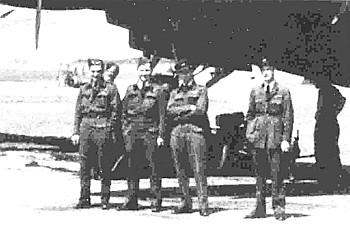Library Reference Number: 040
The Battle Cruisers Break Out
At a crucial point in WW2, Churchill was so anxious about merchant ship losses denying essential supplies to Britain, that on 9th March 1941, he instructed Bomber Command to devote their energies to attacking German warship & U- boat bases. In this account, Andrew Jackson gives a brief glimpse of this period.
 In January 1942, the battle cruisers Scharnhorst and Gneisenau, also the cruiser Prinz Eugen were berthed in the Brest docks. The Scharnhorst suffered bomb damage in July 1941, and lengthy repairs were now completed. As prime targets for RAF bombers, the German navy was well aware of the risk of further damage to their capital ships. A safer haven would be one of their naval ports in Germany.
In January 1942, the battle cruisers Scharnhorst and Gneisenau, also the cruiser Prinz Eugen were berthed in the Brest docks. The Scharnhorst suffered bomb damage in July 1941, and lengthy repairs were now completed. As prime targets for RAF bombers, the German navy was well aware of the risk of further damage to their capital ships. A safer haven would be one of their naval ports in Germany.
By the end of January, intelligence reports indicated a breakout was imminent. A determined effort was made to disable the ships whilst they remained in Brest. On 31st January, a maximum effort was called for by 'Manchester' squadrons to bomb Brest docks. Our crew was one of three placed on stand-by, to attack the ships in daylight should they leave their berths. If the ships set sail and headed for the Atlantic, they were capable of causing havoc to our convoys. On the other hand, they might head for the Mediterranean, and who knows what the outcome might have been. The third option, with the greatest risk (with our navy on the alert) would have been to take the shortest route through the English Channel. As a precaution, mining operations were intensified in the sea-lanes on the approaches to the German naval ports. On the 4th February '42, we took off at 15.30 on a daylight mining operation off the Friesian Islands, but because of lack of cloud cover we were recalled. True to form, the starboard engine became seriously overheated, and had to be switched off.
Was it frustration, or eagerness to resume bombing of mainland Germany that prompted our being briefed for an attack on Mannheim? We took off on 11th February at 18.20 and duly bombed the target. On our return, we ran into some foul weather, and were diverted to Horsham St. Faith, landing at 00.40 hrs on the 12th. Debriefing was followed by breakfast, then off for a kip in a strange bed. Early that morning, frantic phone calls were made to recall all the diverted crews. We landed at Bottesford at 12.30, and were surprised to discover the enemy ships had made a 'break-out' and had been at sea for some time before being detected, and were now approaching the English Channel - panic stations! Ground crews started immediately to service, rearm and refuel the Manchester aircraft, while aircrews gathered for briefing. On running up prior to take-off, our engines developed faults.
While fitters fixed the engines, armourers changed our load. Off came the twelve 500 lb GP bombs, to be replaced by a new weapon - a mine that was intended to drop ahead of the advancing ships. Some hours later, a new order was given, for four conventional mines to be fitted.
We eventually took off at 23.05 hrs. The weather was very poor, and we were forced to fly below the low cloud base that was evident right across the North Sea. Squally showers swept past the aircraft, often reducing visibility to a few yards. Flying at 500 ft we encountered very bumpy conditions, and severe turbulence had both pilots F/O Leland and F/O Southall fighting to keep the aircraft airborne. Finally, we had to contend with severe icing, and were forced to return with our load intact. After debriefing at around 4 am, the entire crew felt frustrated and physically shattered. All credit must be paid to the ground crews who 'had worked their guts out' and made a valiant effort to prepare the aircraft for this emergency. Credit also to our Manchester aircraft whose ability had been proven to equal the most foul and severe weather conditions.
What was the outcome? The Scharnhorst hit and exploded two mines and limped into Wilhelmshaven for repairs that took a year to complete. The Gneisenau also hit a mine and was laid up in a floating dock at Kiel for repairs and where, on 26th February, Bomber Command finished it off. An AP bomb so severely damaged the warship, that it was stripped of its guns and beached. Bomber Command had struck a great blow, and at this time, I completed the last of my 22 trips in the Manchester aircraft. The Lancaster had arrived on the Station.

